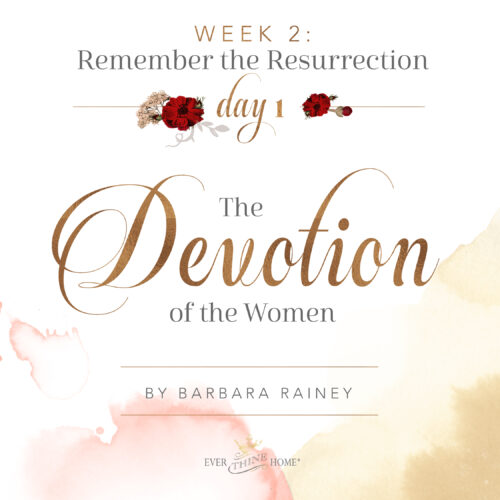
I grew up in a secure and stable family. I never feared my parents would divorce or leave us. They cared for us, loved us, and provided the things my brothers and me needed for life. Though I knew all this was true, I did not always feel loved and secure.
Every home is dysfunctional because every family is composed of broken people who carry losses, heartbreaks, disappointments, and selfishness. My parents both suffered in significant ways as children as did their own parents. These generational losses impacted the parenting of my mom and dad when they were children and then in turn my brothers and me. It is completely understandable.
Physical affection, an abundance of hugs and closeness, was not an everyday experience in our home as I remember it. As a teenager, I became increasingly insecure about myself, not knowing who I was or how I fit, which is typical of many teens. My naturally cautious personality became more shy, timid, reserved, and self-protective. My identity became “the shy, insecure one.”
As I look back on what my parents did for me and for my brothers, it a remarkable tribute to their determination to change what they’d been given that they did as well as they did in creating a home that had a firm foundation.
Which is exactly what every child needs.
Emotional security is the foundation upon which all facets of identity are eventually built. We are made in God’s image, which means we are created with emotions, intelligence, gifts and talents, and a spirit like His. Our identity is a composite of these facets of our personhood.
The emotions of our hearts are a reflection of God Himself.
In the Bible we see God in three persons express Himself in all the ways we do.
- He creates (“Let us create…” Genesis 1:26).
- He gives (“…for God so loved the world that He gave…” John 3:16).
- He loves (“God is love…” I John 4:8).
- He grieves (“Jesus grieved at their hardness of heart…” Mark 3:5).
- He hurts (“He was despised and rejected by men, a man of sorrows and acquainted with grief.” Isaiah 53:3a).
- He longs (“Jesus said, ‘How I longed to gather you together…’” Matthew 23:37).
- He angers (“I was angry with my people.” Isaiah 47:6).
- He delights (“The Lord took delight in doing you good and multiplying you…” Deuteronomy 28:63).
- He names (“To the one who overcomes…I will give a white stone, with a new name written on the stone…” Revelation 2:17).
- He laughs (“He who sits in heaven laughs…” Psalms 2:4).
Our identity as humans, who are made in His image, is supposed to come from God our Creator. A child’s identity, his created uniqueness that sets him apart from every other human, will only be as strong as His understanding of who he is in light of who God is.
Therefore how a child feels about herself: loved or unloved, competent or incompetent, free or enslaved, empowered or shamed will either support or nullify all natural giftedness, talent, and intelligence. Emotional health also strongly supports the development of your child’s character and relationships.
For a child to feel secure and safe, for teens to develop a confident sense of identity, for your children to become emotionally healthy adults, they must know they are loved and cared for by those who have the power to do them good. In the formative years, this responsibility is initiated and nurtured by parents. Children must learn love at home from mom and dad.
From the seconds immediately following birth, a child either responds in security to the warm welcome embrace, kisses, and love she is given by her parents or he responds in bewilderment and fear, building early defense mechanisms to protect from a lack of parental love and presence. Attachment to mom and dad are identity-shaping experiences.
But this nurturing doesn’t end when your little one grows out of diapers. It is your responsibility to nurture the emotional development of your children, which in turn shapes their identity, throughout their toddler, elementary, and teenage years.
I knew this. So as I entered the parenting process with my own little ones, I worked hard to foster closeness and openness: snuggling on the couch reading books, encouraging their expressions of emotion, welcoming creativity in spite of the messes. But as our children got older, I saw that I was often reacting or retreating out of fear because I didn’t know how to nurture emotional health in teenagers.
I recognized how it was easy for me to kiss the little ones, to stroke their faces and cuddle them. But it was much harder for me to do that with my now 13-year-old daughter and 12-year-old son.
Our oldest, Ashley, noticed and made little snide comments about how I was spoiling the younger ones, giving them too much attention. I remember thinking at first, It’s okay that I am not as close to the older ones. That’s just who I am. And besides Dennis is very good with our teens. I figured I could concentrate on the younger kids, he could concentrate on the older ones, and everything would just be fine.
Eventually, I understood our daughter’s criticisms were her way of letting me know that she was not getting from me the affection and nurturing she still desired and needed. I made a commitment to myself and to the Lord that I would begin to express more affection and more emotional closeness as best as I could with my teenagers. I remember with Ashley intentionally going into her room to hug her really tight, even though it felt awkward to me because I had not received similar affection when I was a teenager.
I also realized that by meeting her needs emotionally at home, I was helping to protect her from getting her emotional and security needs met from others, especially boys. It was like a light went on and I understood, If she does not get love and security from me and her dad, then she is going to have a vacuum in her heart that she will seek to fill in unhealthy relationships.
Moms and Dads, you need to ask yourself, “Does my child feel love from me or does he just know that I love him?” There is a big difference. My child needs to feel loved, she needs to feel cared for in a real emotional, intimate way that only comes from appropriate affection and physical closeness.
Speak to yourself. Tell yourself today at 35 or 40 or 45 to step up and move into the emotional space of your children, even if it is uncomfortable. Tell them you don’t know what you are doing because you didn’t experience it. Your kids will welcome your admission with grace and a willingness to figure it out together.
Our goal as parents is to teach our children to feel and name their emotions, to help them learn to identify what is driving them, shaping their decisions and reactions. Then we teach, instruct, and train them to express those emotions in healthy non-offensive, non-hurtful ways. We’ve all seen the tragic, destructive actions of neglected unloved teens who tried to shape an identity and a purpose by aligning with violent groups online. Feeling loved unconditionally tells a teenager his unique personality and gifts, his identity, are good.
Be alert as parents
When I was 40, I had corrective heart surgery. A couple days before I went to the hospital we asked our two youngest to clean up their room. As we came back later to then put them to bed, we noticed that Deborah had stuffed everything under her bed, which wasn’t the way she usually cleaned up her things.
The Spirit of God prompted one of us to ask her how she was feeling. She said, “I’m scared.” We said, “What are you scared about?” She said, “Well, I am sad.” We said, “Well, what are you sad about?” Then, she began to cry and she said, “I am afraid Mommy is going to die.”
We hadn’t talked about the severity of the surgery with our children, wanting to help guard their fears. In spite of our caution, our seven-year-old perceived the uncertainty of the circumstances, becoming afraid. Her way of dealing with that emotion, stuffing everything under her bed, is a picture of what we do with our feelings. All children need training and practice finding, naming, and properly expressing their emotions.
With some children you will need to work extra hard to help them identify feelings. Several of our firstborn grandchildren are naturally reserved, intelligent, follow-the-rules kids who value factual thinking. Ashley, mother of our oldest grandson Samuel, decided he needed to learn to recognize and name his emotions. She announced to him and his brother James, a natural feeler, that she was going to start asking them every day after school to describe one positive and one negative or unpleasant emotion from their day. Samuel said he didn’t want to. It sounded hard, he stated. James enthusiastically said, “Oh this is going to be easy. I got this!” What a dramatic difference in our emotional makeup as people!
The exercise only lasted a few weeks but even in that short time frame, Samuel learned to look within and describe his daily experiences at school by how he felt. Identifying the positive basic emotions like happy or enjoyable proved to be reasonably easy after a while. One day he also tried to summarize his day as normal, but Ashley told him normal wasn’t an emotion and to try again!
Train your children to know healthy and unhurtful ways to express their emotions.
One night we had a family discussion after dinner to talk about anger. With eight broken, sinful people living in a four-bedroom house we had lots of anger in all its various forms!
So we asked the kids, “What do you feel like when you are angry?” They answered, and we wrote their answers on a poster board:
- I feel like screaming.
- Like out of control
- Like hurting someone; mad; hitting something
- Exasperated
- Verbal vomit
- Like tearing up things
Then we asked, “What are the kind of things that make you angry as a child or a teen?”
- When you feel left out or excluded by a family member
- When you get hurt
- When people make fun of you
- When people cheat
- When people are being a pest or picking on you
- When you are disciplined
- When people use my stuff without asking
- When people don’t give us what we want
- When people don’t pay attention to what we are saying
Then we said, Want to know what makes us angry as parents? I don’t think they actually cared, but we told them,
- When children disobey
- When children ignore what they are being asked to do
- When we are misunderstood by each other and other people
- When we are hurt
Our anger problems were not solved that night. That wasn’t the goal. Instead, we hoped to simply help our children understand that anger is a normal emotional response, not a wrong emotional response. How we express it is what usually turns it into a negative sinful situation.
We spent multiple hundreds of hours correcting our children’s inappropriate, hurtful ways of expressing their anger, hurt, disappointment, and fear. Thousands of times we said things like, “You may not hit your brother when you are angry at him. You may not scream at your sister. You may not break something when you feel overlooked…”
Human emotional expressions are never totally pure, righteous, or good the way that God’s are. Our complete brokenness and depravity compromises our every intention. It is why we so desperately need the power of God’s Spirit within us to make our marriages work and to raise our children in a somewhat healthy way.
Remind your children as often as necessary to express respect for others, including their siblings, for we are all made in God’s image. We all have dignity before Him. Respecting one another’s dignity is crucial in building a stable identity that says, “The way God made me is good.”
And don’t forget to reinforce respect for your authority as parents. Recently we had a conversation with several couples one evening after dinner while on our FamilyLife Love Like You Mean It cruise. During the laughter-filled banter, our son-in-law told about the time he got in the face of his two oldest sons and sternly and firmly told them they had to stop talking to their mother, “his wife,” disrespectfully. He told them the consequences would not be pleasant if they didn’t learn self-control over their mouths. They knew he meant it.
Children want and need feedback from their parents, especially as they get older. You are their measuring line. You are their report card. You are their most important cheerleaders who must celebrate every good decision, rejoice with all right attitudes and reinforce all the good they choose to embrace.
Listen to their hearts, their emotions. Children want to be heard and understood, not lectured. Make your home a safe place for self-expression, for processing the hardships of life, for learning emotional boundaries. And daily reaffirm you love and acceptance of each child, even and especially when he makes mistakes. Model God’s unconditional, grace-filled love in your home.
Refute the tendency in the Christian community to deny our emotions. It’s easy to overly spiritualize things that are a part of how God made us. Individually and as a family, choose to embrace the beauty of emotion in your home and watch how God grows your children’s identity as a result.
Plan a date with your husband, even if it’s an after-the-kids are-in-bed living room date with two cups of decaf. Find even thirty minutes to talk about these questions and how you can improve intentional relationship building with each of your kids.
- Maybe you grew up in a family like I did, where emotions were controlled. Admit that to yourself and to your spouse. Discuss how that impacts your parenting today.
- Describe your day to each other with one positive emotion and one negative emotion. Start practicing what you want to pass on.
- Begin talking to your children, even this week, about emotions. Agree on a time that as a family you’ll each share a positive and negative emotion.
- Have your family brainstorm healthy and unhealthy ways to express the emotions they name.
- Regardless of your family upbringing, consider writing a tribute to honor your parents. It’s one of the best things I ever did. It is a life changing experience because it is obedience to the fifth of the Ten Commandments, honor your father and mother. Dennis wrote an excellent how to book on that you can check out here. Trust me, you’ll want to receive one from your children one day; so again, start practicing what you want to pass on.





I’d like to know how this all works out with a child who struggles with Sensory Integration. There are times I’m just not sure how much she’s actually processing, yet other times she’s so very “present.” Do you have any resources to suggest that come from a *biblical* point of view, one that does not embrace the current laissez-faire “gentle parenting” approach common among 30-something millennial parents?
Thanks 🙏🏻 so much for this – as a mother , realizing these things later than I’d hoped, doing my best to set things right is a challenge. Your
sharing theses important points we can pass on is so helpful . Much appreciated .
It’s never too late, Holly! So glad this post encouraged you to do the best you can NOW. He will honor that!
This had a lot of great information! It was so well written and insightful! Loved it! Thanks
I loved hearing from Ashley at her break out session. & I loved meeting u too at the Family Life Women’s retreat. To God Be the Glory!
This is wonderful!! Oh that I had had this wisdom when my children were littles and in our home. I pray to do better with our grands.
My parents are gone. I am so glad I expressed my love to them and wrote them letters also to express my love. My children are grown and we reach out weekly and sometimes daily to express our love to each other
Thank you for taking the time to write this out and share/encourage parents to be intentional about showing love to your children, and teaching children about emotions. My children are grown and I too didn’t hug and show a lot of physical attention to my teens, or even my younger children regretfully. There was a lot of good suggestions here and I am going to make every effort to show them I love them, whether it’s a card, a phone call, or going out for coffee or a walk.
Thank you Again,
JC
Wow! This article was such a blessing. I loved the part about how as parents it’s our job to teach our children to feel and name their emotions. Thanks for sharing!!!
Thank you so much!!